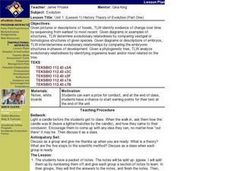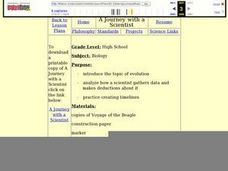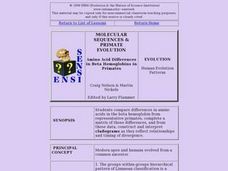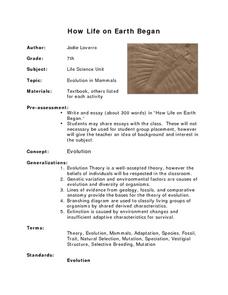Curated OER
Finding the Ages of Rocks and Fossils
Students practice dating fossils. They learn the concept of "deep time"--that earth was formed billions of years ago. They experience excellent hand-outs and virtual age tutorial links.
Curated OER
A Peek at the Past: Gradualism vs. Punctuated Equilibria
Learners consider two sets of simulated fossils (caminalcules) that are provided as cutouts. They arrange them on two time scales. One set produces a visual example of gradualism, the other shows punctuated equilibria.
Curated OER
The Earliest Primates
In this early primate learning exercise, students will read information about the fossil evidence of the earliest primates. Students will complete 3 short answer questions based on their reading.
Curated OER
History Theory of Evolution
Students identify fossils. They identify evidence of change over time when given pictures of fossils to determine the proper sequencing. In addition, they determine evolutionary relationships by comparing embryonic structures.
Columbus City Schools
Diversity of Living Things
Here's a topic classes can really dig—the fossil record. Use the well-organized and thoughtful road map to take eighth graders back in time to unearth the answer. Learn how our climate has changed, and how organisms have...
Curated OER
Do-It-Yourself Fossils
For this fossils worksheet, students create their own casts, molds, imprints, and embedded fossils. Then students complete a fossil comparison chart. This worksheet has 12 fill in the blank questions.
Curated OER
Be a "Fossil Detective" an Effective Tool in Earth Science Education
Students examine the geological time scale: the Earth is ancient; time can be divided into periods based on its fossil content.
Curated OER
Fossils: The Eras of the Earth's History
Students research the four geologic eras of Earth's history. In this extension on a fossils lesson, students research the different eras of Earth's history. Students use AppleWorks to create a bar graph containing information of the four...
Curated OER
Evolution Concept Map
In this biology worksheet, learners complete a concept mp on the theory of evolution by natural selection. They fill in 8 blanks with the correct terms from the list.
Curated OER
A Journey with a Scientist
Pupils work in groups as they read chapters of Charles Darwin's, Voyage of the Beagle. They take notes on the chapter and in their group make a timeline of the chapter. They tape the timelines together in order to depict the entire...
Howard Hughes Medical Institute
Comparative Anatomy of the Domestic Chicken
Are chickens and crocodiles really related? Young scientists compare the bone structure of current domestic chickens to other animals throughout evolution. This helps them understand the branches that separate crocodiles and birds as...
Curated OER
Molecular Sequences & Primate Evolution: Amino Acids, Hemoglobins in Evolution
Students compare differences in amino acids in the beta hemoglobin from representative primates, complete a matrix of those differences, and from these data, construct and interpret cladograms as they reflect relationships and timing of...
Curated OER
Bermuda: Search for Deep Water Caves: Living Fossils
High schoolers explore relict species. In this anchialine cave lesson, students identify relict species associated with anchialine caves, and explain the importance of preserving anchialine caves and species.
Curated OER
Evolution Number Two
Are you looking for evidence that your high schoolers are adapting to the concepts of natural selection and evolution? Assess their knowledge with a pretest and posttest. Naturally, you can select and adapt the activity to be the fittest...
Curated OER
How Did Humans Evolve?
Students complete an online activity in which they examine fossils to find possible hominid family trees.
Curated OER
How Life on Earth Began
Seventh graders investigate the concept of evolution and how it was a mechanism for the foundation of life on Earth. They conduct research and attempt to make cognitive connections with the evidence to agree with the presupposition of...
Curated OER
How Did Humans Evolve?
High schoolers are introduced to four important fossil finds: the First Family, the Hadar Skull, Lucy, and the Laetoli Footprints. They explore how scientists interpret fossils to try to better comprehend how humans evolved. This...
Curated OER
Explorations Through Time
For this earth history worksheet, students visit a website and complete 15 fill in the blank and 8 short answer questions based on what they read. Topics include biodiversity, animal kingdoms, evolution, fossils, and extinction.
Curated OER
Fantastic Fossil
Students discuss the discovery of a transitional animal, Tiktaalik, and its impact on the theory of evolution. They research theories of evolution and creationism.
Curated OER
The Effect of Natural Selection on Genes, Traits and Individuals
Rotating through five stations, evolutionary biologists explore the question of how changes in DNA facilitate the changes in a population over time. High-quality, colorful cards of animals, skeletons, skulls, and DNA sequences can all be...
Curated OER
Becoming Whales: Experiencing Discoveries of
Students experience, through a "dig," the historical discovery of fossils which increasingly link whales to earlier land-dwelling mammals. They encounter the intermediate forms which show changes that lead to the modern whale.
Curated OER
The Rise and Fall of the Mammoths
Students develop an understanding of the evolution of species in the context of the woolly mammoth. They examine the fossil record to explain natural selection.
Curated OER
Diversity/Natural Selection
High schoolers examine mechanisms behind biological evolution and the theories that feed it, and are able to demonstrate their knowledge of these theories in a story.
Curated OER
Natural Selection and Evidence Worksheet
Matching and fill-in-the-blank exercises give biology whizzes a chance to practice vocabulary associated with evolution. Terms to be reviewed focus on evidence for evolution, natural selection concepts, and some genetics words. You could...























